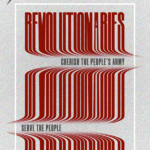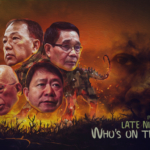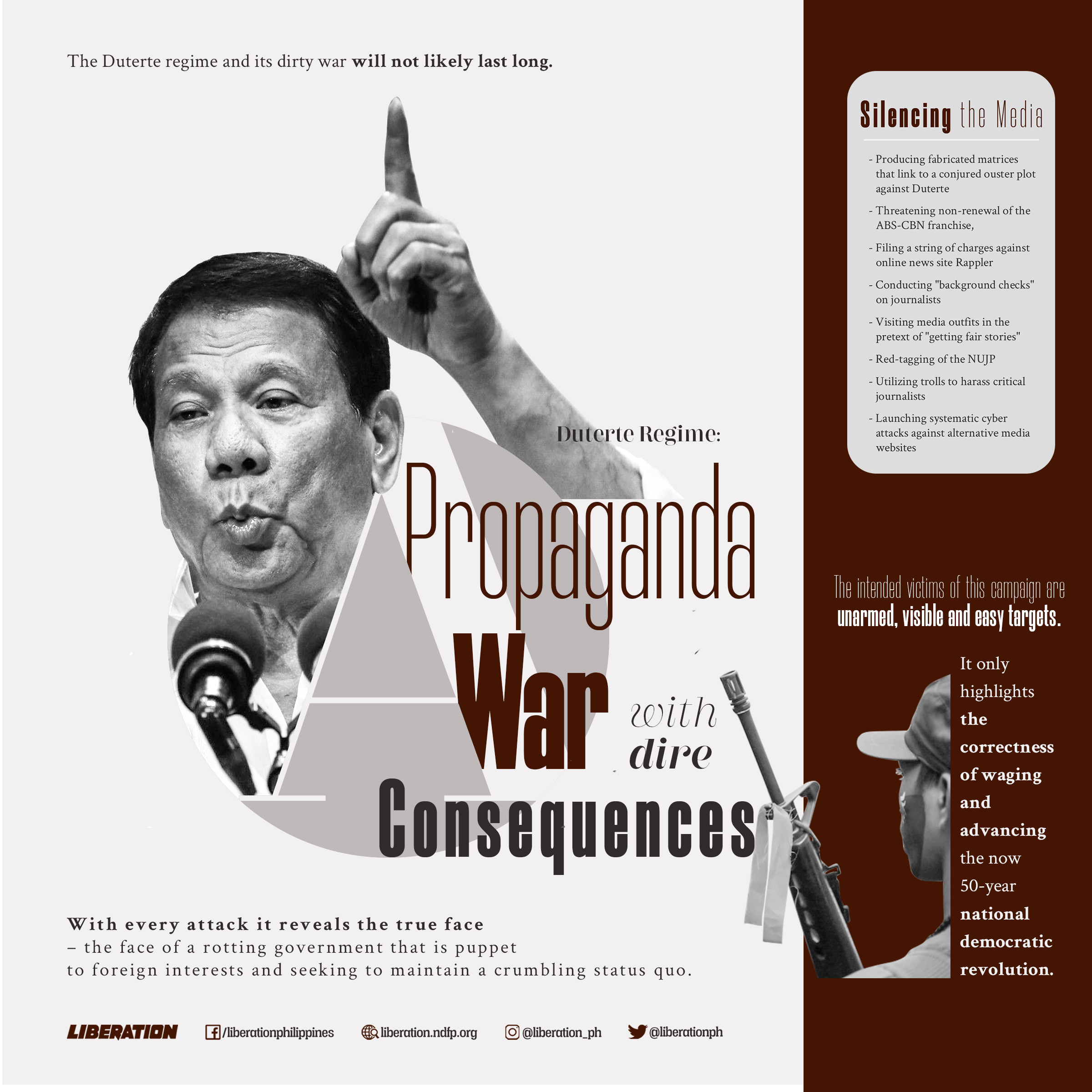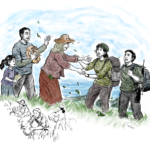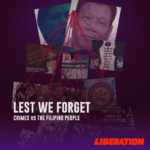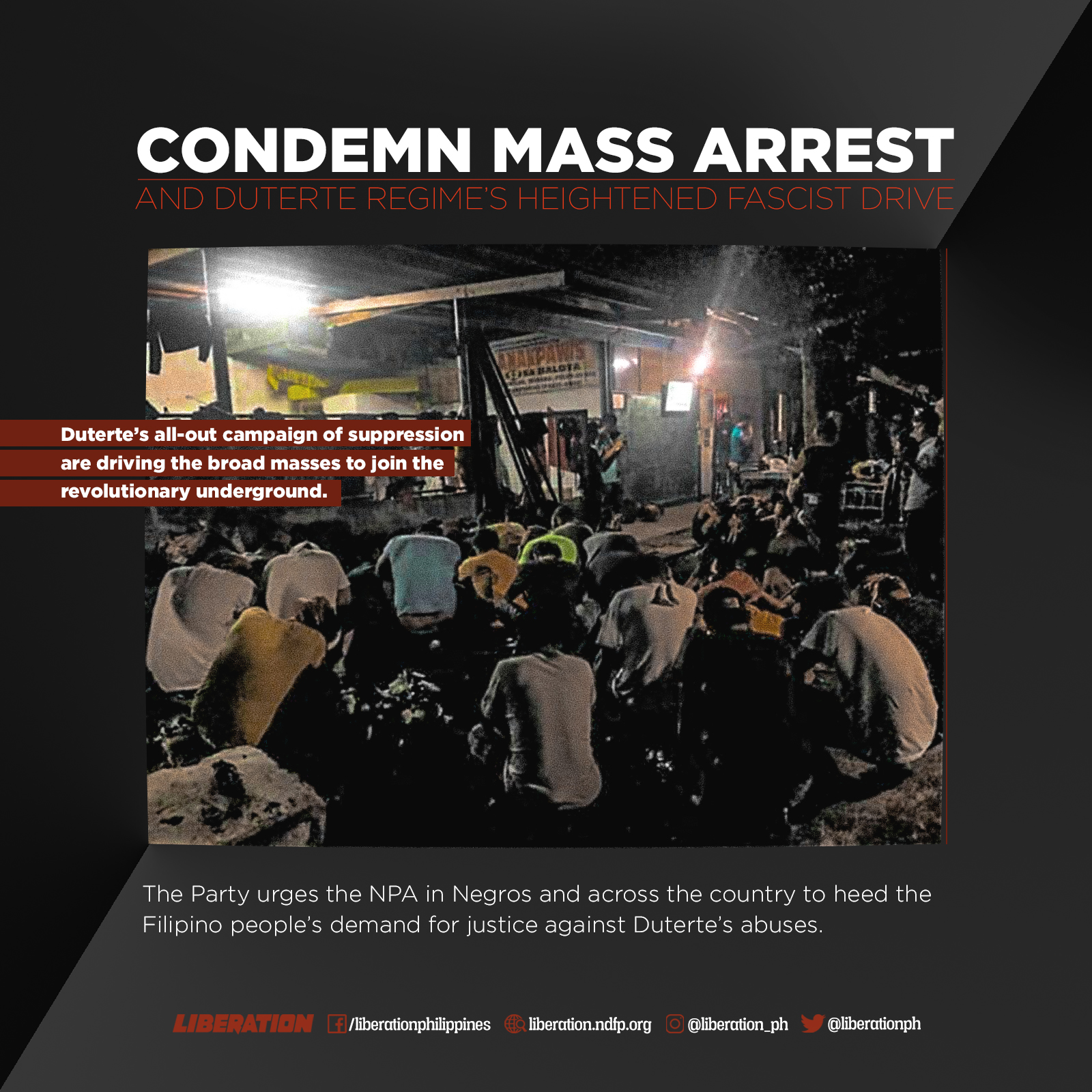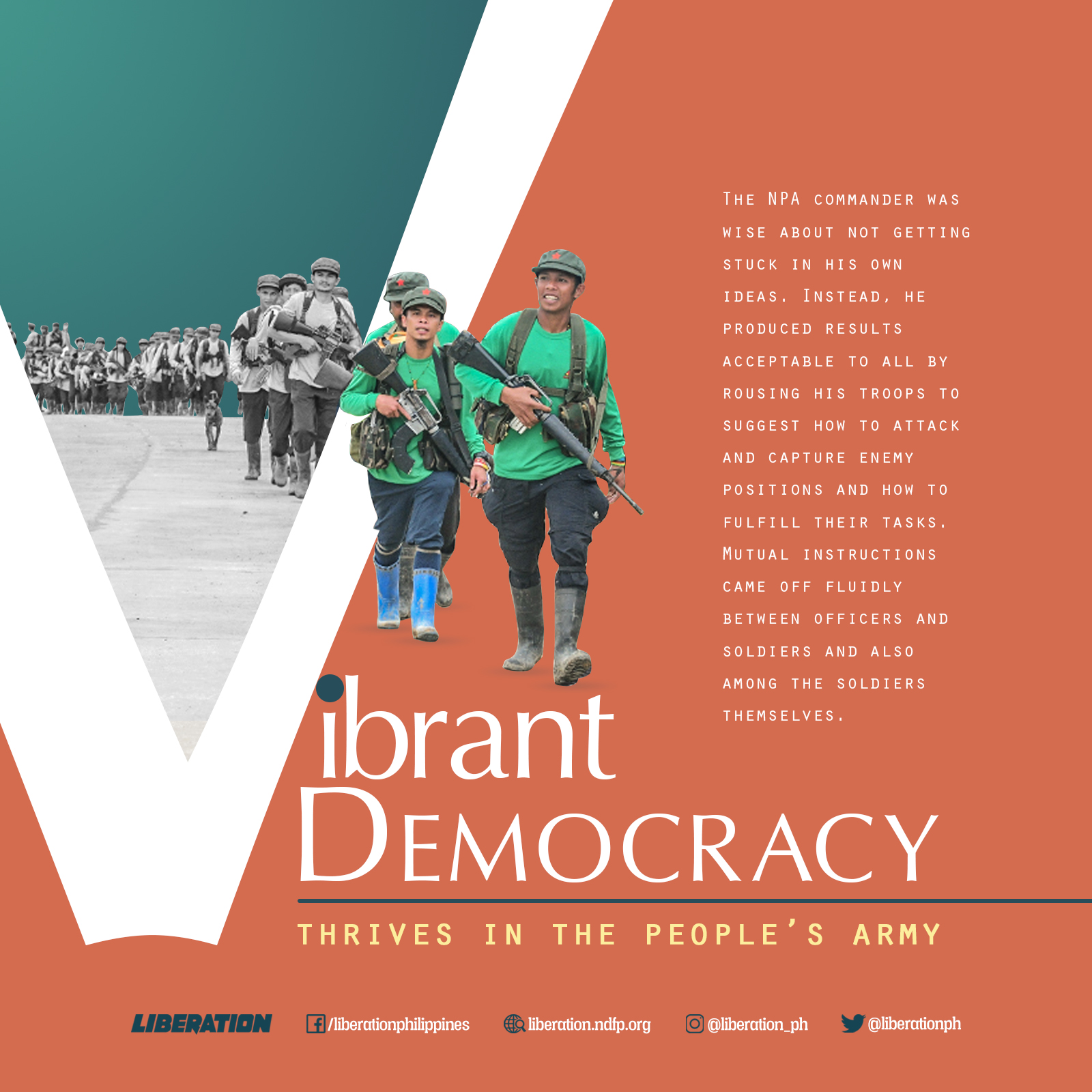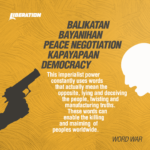In PH guerrilla zones: How the revolutionaries respond to pandemic
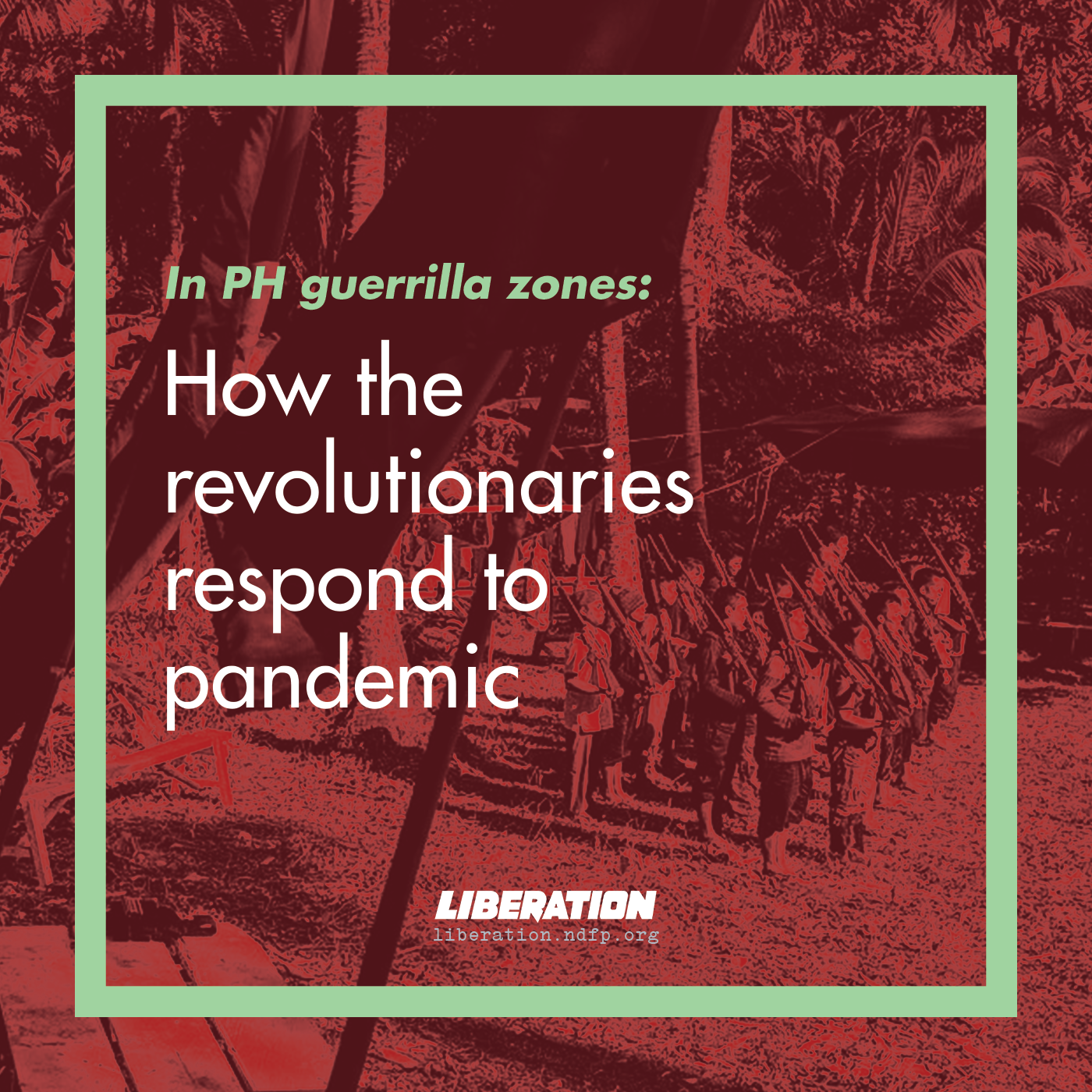
Immediately after the World Health Organization declared the Covid-19 pandemic, the Communist Party of the Philippines (CPP) directed the fighters of the New People’s Army to “step up efforts to render social, economic, medical, and public health services to the people.”
On March 26-April, 2020, the CPP also declared a ceasefire as a response to the call of UN Secretary General Antonio Guterres for “a global ceasefire between warring parties for the common purpose of fighting the Covid-19 pandemic.”
https://cpp.ph/statements/npa-is-already-geared-to-covid-19-response-even-without-ceasefire/
The Party and the people’s army mobilized the organs of political power and the revolutionary mass organizations affiliated with the National Democratic Front nationwide to conduct information campaign on Covid-19 virus and to implement social services and community actions “to respond comprehensively and extensively to the threat of the virus.”
NPA units worked with local people’s health committees, carried out mass campaigns, and enhanced the long-time practice of collective action. Providing services to the masses is among the functions of the NPA and the organs of political power in the guerrilla fronts which, expectedly, the reactionary government refused to acknowledge up to now.
The various services put to good use the contributions of friends and allies, and revolutionary taxes—shaming the reactionary government’s trillions of annual budget and trillions more of loans spent to run its war machine and line the bureaucrats’ pockets.
The NPA is not only a fighting unit but also engages in agrarian revolution and mass base building—which continue even during pandemic and under attacks by the enemy forces. Base building for the NPA includes organizing, production work, cultural activities, and health care trainings and services, among others. It works with the local Party organization and revolutionary mass organizations in the communities to set up health committees or medical groups. Even before the pandemic, NPA units and local branches of the Party held clinics for the masses, conducting check up for high blood pressure, diabetes, cough and common colds, dental services, and minor operations. Alternative treatments were used such as acupuncture and herbal remedies.
https://liberation.ndfp.info/main-stream/health-services-benefit-peasants-indigenous-peoples-in-guerilla-fronts/
https://cpp.ph/statements/reply-to-questions-by-kavel-alpaslan-of-gazete-duvar-on-the-revolutionary-health-system-and-response-to-the-covid-19-pandemic/
The tyrannical regime of Duterte prevented the NPA from carrying out its duty to provide assistance to the people in the revolutionary areas to overcome the Covid-19 crisis. It violated its own ceasefire. It attacked communities and went on a shopping spree for fighter jets, attack helicopters, drones, tanks, bombs and other military equipment—a huge amount of money that was better spent on mass testing and strengthening the health system.
https://liberation.ndfp.info/a-public-health-system-battered-by-the-regimes-budget-cuts-corruption-cases-and-neoliberal-policiAes/
https://liberation.ndfp.info/counter-current/dutertes-shopaholic-armed-forces-strikes-again-how-kill-kill-kill-misuses-peoples-funds-then-harms-them/
On April 23, 2020, for example, the 20th Infantry Battalion of the Philippine Army attacked a unit of the NPA in Eastern Visayas which was conducting information campaign on Covid-19, at a time when a ceasefire was still in place. “It is inhumane and cruel in that it impeded the assistance that could have been provided by the NPA and is much needed by the masses deeply affected by the current public health and economic crises,” said the Efren Martires Command in a statement.
Aside from bombings and shelling, illegal arrests and detention of suspected members and supporters of the NPA, food blockades, and coercing the people to “surrender” to the government, the AFP sabotaged and discredited the efforts of the Party, the people’s army, and the mass organizations’ campaign on public health, sanitation, and food production. This was no different from what the legal mass movement in urban centers experienced in conducting humanitarian and relief missions in urban poor and peasant communities.
But neither the intensified and sustained attacks against the revolutionary movement nor the limited resources on-hand hindered the efforts of the NPA. The masses warmly welcomed the Party and the NPA’s leadership, and with them, they planned and instituted measures to prevent the spread of the disease and ensure the steady supply of food in the communities and prevent hunger.
Here are some of their cooperative efforts gathered from the various Ang Bayan news stories:
Health education and services
The health committees of the revolutionary mass organizations actively engaged in information campaign on Covid-19—distributing leaflets, education sessions, meetings, and trainings. In Bicol, the people’s army and members of organizations used cultural forms such as plays, dances, and songs to discuss the health situation and how to avoid contracting the virus. These were performed during medical trainings, mass clinics, and meetings.
The NPA in Central Negros under the Leonardo Panaligan Command provided medical services to at least 1,000 farmers during the first lockdown in March 2020. The Red Army, organized check-ups and provided vitamins and herbal medicines for fever, cough, and colds. They were assisted by members of the barrio health committee, Makibaka and Kabataang Makabayan, underground organizations of women and youth, respectively.
The NPA in Surigao del Sur under the Northeast Mindanao Regional Operational Command focused its efforts on agriculture and health programs such as sanitation, mass clinics, and planting of herbs for medicine. It actively organized education activities on how to prevent the transmission of Covid-19 and manage those affected.
The NPA in Samar and the revolutionary mass organizations held health orientation seminars, trainings on the use of acupuncture and herbal medicine, and prepared health protocols in 17 barrios. They identified possible facilities for quarantine in case someone is infected by the virus. Also, part of their plan was to create herbal gardens and plant food crops.
The people’s army also launched basic medical training among members of the four units of the NPA, barrio health committees, and members of the Pambansang Kalipunan ng mga Magsasaka (PKM, revolutionary organization of peasants). The newly trained medics later held a mass clinic where they checked-up more than 400 residents in four barrios. In the base areas, the NPA led in maintaining sanitation, making and wearing of face masks, and in practicing physical distancing during gatherings.
The Medardo Arce Command in Southern Mindanao assisted all organs of political power and revolutionary organizations to respond to the health crisis. They launched information and health and sanitation campaigns; and drew up preventive measures which were implemented in the communities. Because the NPA unit also operates in suburban communities near Davao City, the people’s army included in its protocols the timely monitoring and immediate reporting of Covid-19 infection in the communities. Health workers were on standby for urgent consultations and referrals.
In a barangay in Quezon Province, a unit of the people’s army conducted sanitation and education campaign on Covid-19. They held mass clinics to check-up on the masses and provide basic medical services and helped in planting vegetables and root crops. While in the barrio, they also taught the children of farmers how to use the internet and cellphones for their online classes and tutored them in their lessons.
Relief operation and mutual aid in food production
The lockdown restricted the farmers in going to their farms, selling their produce, and in buying their food supply. Aware of the reactionary government’s almost nil assistance to the people, the CPP directed its forces to “carry out emergency food production and intensify economic work in revolutionary territories,” on top of providing medical assistance. Aside from mobilizing its forces and the masses, the Party also urged the landlords to let the peasants use the land for food production without rent, extend financial assistance, and allow access to other farm facilities owned by the landlords.
The NPA units and the local organs of political power held economic conferences to appraise the needs of the masses and plan for immediate and increased food production such as planting of palay, bananas, corn, vegetables, and root crops. In Surigao they launch a campaign for mountain farming in areas with available spaces.
To meet the challenge of the pandemic, the revolutionaries enhanced their cooperative endeavors that have long been a practice in guerrilla fronts. They particularly boosted cooperative activities impacting on food supply of the people
In Bicol, the NPA and the farmers consolidated their grutul (mutual aid groups in production) to plant fast-growing crops for their consumption. Local party branches also provided emergency relief packs to immediately address hunger in the communities. The PKM also conducted a feeding program. During these activities, leaflets on Covid-19 were also distributed.
In Southern Mindanao, units under the Merardo Arce Command launched food production campaign to ensure food security in guerrilla bases and zones while advancing the agrarian revolution in areas they can reach. The capacity and leadership of the revolutionary forces in Southern Mindanao have been proven especially in the rehabilitation and reconstruction of communities after the super-typhoon Pablo hit the region.
All the regions cited were among the most militarized regions in the country, where the bulk of the AFP units are concentrated in the Duterte regime’s attempt to meet its own over-extended deadline to neutralize the revolutionary movement. On top of responding to the challenges of the pandemic, the CPP has called on the NPA to “heighten the military struggle against the fascist and tyrannical regime.” It is through this that the revolutionary mass base can be defended and the tasks of building the organs of the political power can advance in the countryside.###

